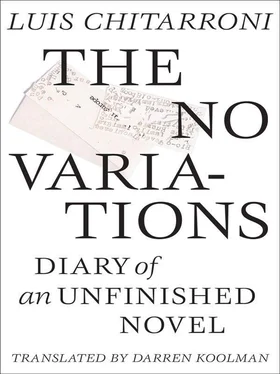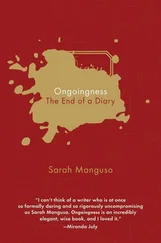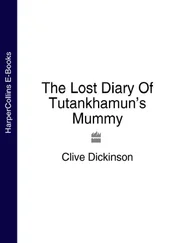[I spent most of the following day in my room. Tony had given me his old TV set. First, I watched an English film that I remembered having seen before on Spanish television. I was surprised on recalling what it was about, and had to conclude it was a sign, a portent: it’s a film about a boy who rides his rocking horse until he almost goes mad, and was inspired by a D. H. Lawrence short story.]
Henrietta knew nothing about the society of St. Mawr; Malcolm knew even less; and neither ever heard a word about Bertram Fortescue Wynthrope-Smyth. After dismissing the possibility he was a patient at the clinic, they thought it must have been a [practical, elaborate] joke. The intrusion sounded puerile to them, and the idea of a chimney sweep being part of a secret society was scarcely credible. Although Melchior (who was about to begin his journey back to Amsterdam, from which he came the previous day), knew many a ghastly tale about the horrors and abuses suffered by boys employed as chimney sweeps. “Back in the Victorian Age,” said Henrietta, interrupting with a self-conscious harrumph. Afterwards, we began discussing the many idolatrous sects that are active in England today. Some are innocent enough, like Man o’ War (although there was a fanatic among its members who happened to own the Books of Last Reason, which of course we’d all read), while others were quite dubious, like Henry the Horse, which was only a cover used by a group of heroin addicts for whom the syringe was both emblem and institution … and which claimed, as a badge of merit, to have some Argentine doctor at their disposal. Tony was the one who paid most attention.
Melchior, an expert on Slavic languages, interrupted with an observation taken from the novel, Petersburg , by Bely, in which it is claimed that the single most important person in the bureaucratic hierarchy of St. Petersburg was the chimney sweep. After reciting the passage [to us] in Russian, he continued with the pushkina karta [read in the Tarkovsky film], and [then] concluded with something from Eugene Onegin .
Luckily, that afternoon I received the first file on Agraphia , and the first report on The Megalithic European , Tadeus Oliphant, born in Yden …, about which I once heard him speak …
Friday, Tony and I decided to go to the meeting and attend to all the formalities. We had on the necktie and jaspé sash the committee requested we wear. In the Badger & Boar — or was it the Ferret & Bear? — we met up with our guide, a Terry-Thomas lookalike, who led us through an alley into a dimly-lit premises. The alley was so dark the single candle that illuminated the place dazzled us to temporary blindness.
A few flights down, Bertram Fortescue Wynthrope-Smyth presided over the meeting, as if he were the mad hatter (whom he resembled somewhat). He spoke with a high voice, and that impeccable accent, which — perhaps because of his explicative tone — now sounded like that of a BBC newsreader … Truth be told, we understood very little (we should’ve also given a necktie and sash to Malcolm so he could come along and interpret), but from the small amount we [from the little Tony and I] managed to decrypt, we concluded that:
a) The fictional St. Mawr from Lawrence’s story had actually existed, but had been dead for some years.
b) Then he was reborn in the United Kingdom — in Wales ( of all places ), to be exact — since his father, who was of uncertain origin (a stallion, apparently rejected by the Spanish equestrian school in Vienna), was grazing in a sleepy meadow a few miles outside London.
c) Given the society was non-profit, and since it was so expensive looking after a horse, after six months, it required the radical intervention of a couple of prosperous American entrepreneurs (and philanthropists) to ensure the mating was successful.
d) Once the cult of St. Mawr was born, it committed itself to what was called “the small instauration” and to “the little idiom.” No one ever mentioned St. Mawr’s mother.
From the back, an elfin-looking creature came out dressed like an altar boy, his surplice trailing along the floor, carrying an object covered by a type of serviette on which everyone presently swore an oath. When our turn came, Tony nervously tried to repeat the words he heard muttered by the others. The object turned out to be nothing more than a well-thumbed [Penguin] edition of Lawrence’s book. It wasn’t even a first edition, but one with an introduction or epilogue or additional commentary (I forget which) by the great Leavis.
Bertram Fortescue’s closing words were:
— Like Numa Pompilius, one presides over this society with the assistance of a muse. Latinisms aside, she will never attend these meetings unless some great calamity befalls one, in which case, she will take one’s place …
Afterwards, Bertram Fortescue Wynthrope-Smyth gave us a leaflet from which I learned how to spell his name [correctly].
Three days later, a letter arrived. It was addressed only to me. Offended by the apparent snub, Tony resolved never again to mention anything to do with D. H. Lawrence or even the ridiculous name of that emperor of chimney sweeps.
I took a train to St. Pancras, and from there, grabbed a taxi to Durward Street. I was beginning to get the impression I was in a film: the changing scenery, the developing plot, the cinematic sequences — particularly on my journey through the city — it all seemed so contrived, I felt I was in a movie theater watching myself, waiting to see what would happen next. In the taxi, I passed by some posters of Kate Bush peeling off the buildings, advertising yet another comeback. How sensitive we are to every second of our aging. The London I saw will already be old by the time this is read. The taxi dropped me off in front of an enormous warehouse. I rang the bell and the door was answered by Mrs. Prothero.
The house was done up to appear as homey as possible, although it wasn’t very clean, and the wallpaper told only of the proprietor’s dubious taste (apologies, Chesterton), a typically English, middle class residence, with a steep staircase and hallway decorated with watercolors depicting uncertain scenes from an English countryside that exists only in folklore.
I was told to wait for my contact in a room with two facing chairs of very different design, a small table, and a china cabinet adorned with trophies, badges, a diploma, and some statuettes of canines. Out of the jumbled mess on the table, there protruded a book about children’s art by an author whose face — which appeared on the cover — looked as if it was once used as an ashtray. The small bookshelf in the corner contained nothing of interest — tourist guides, cookbooks, the Gayelord Hauser diet — except for two Penguin publications [from the Tschichold or Schmoller period] of Anthony Powell books that were written before his A Dance to the Music of Time cycle — the one with an illustration by Osbert Lancaster — both delights for any collector, especially one as obsessive as myself, who was tempted to steal them [+ who stole them, afterwards ]. In the other corner (the one to my left, from where I was seated), there were stacks of old records. I walked over to have a closer look [at the covers]: Vera Lynn, Matt Monro, Engelbert Humperdinck, Helen Shapiro, Patsy Cline … Then I suddenly heard a noise and [swiftly] returned to the seat Mrs. Prothero had assigned me — a rustic armchair that was facing the second staircase.
From there, I saw a pair of shoes descending, the tips of which were parted to look like hoofs (I believe I saw them advertised in a shop window on the King’s Road), then a pair of magnificent legs [atavistic, oriental], then a body sheathed in a leotard, which was either brown with yellow ocellations or yellow with brown ocellations — either way, alluring, either way, entrapping, consuming — a pattern to excite the male libido, the ashes of which are trampled underfoot (or hoof). She really kept me waiting. I was already five minutes late on arriving.
Читать дальше












